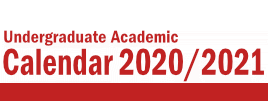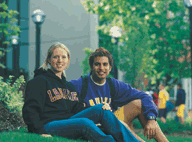Admissions
Website: www.wlu.ca/education
1.0 General Admission Policies
There are different
admissions requirements for the Primary/Junior and Junior/Intermediate
programs. Admission into the Faculty of Education is based 50 percent on
academic achievement and 50 percent on information submitted in the
Experience Profile.
Enrolment in the Faculty of Education is limited and fulfillment of the minimum admission requirements does not guarantee admission into the program. Mature students must meet the same requirements as all other candidates. Incomplete or late applications will not be considered.
Applicants who have listed more than one program choice on their application must list their choices in the order in which they would like to be considered. Applicants who have applied for more than one program only need to send one copy of their required documents.- Admission Average
A minimum academic average of 70% (B-) on the most recently completed 10.0 full or 20 0.5-credit undergraduate university courses is required. Only undergraduate university courses completed by September 1, in the year prior to anticipated entry will be counted in the admission average. If credits are still in progress at the time of application, they will solely be considered to fulfill junior/intermediate subject requirements. Applicants must request a second transcript with final marks to be sent to Wilfrid Laurier University no later than January 31 in the calendar year of anticipated entry. Preference will be given to students who have completed, or who are completing a four-year degree with a minimum of 20.0 full or 40 0.5-credits. Applicants presenting a three-year degree will still be considered for admission into their program of choice. Applicants who have completed, or who will complete a master's degree by July 31 in the calendar year of anticipated entry will receive additional admission points. Applicants who present a college/applied degree will be assessed on a case-by-case basis. Official university transcripts ordered through OUAC or issued from an accredited university must be sent directly to Wilfrid Laurier University no later than the second Friday in December in the year prior to anticipated entry.
Applicants who have attended universities on a Letter of Permission or international exchange must provide an official transcript from the international institution(s) attended. These applicants should also send specific course descriptions or an academic calendar from the institution(s) attended to Wilfrid Laurier University no later than the second Friday in December in the year prior to anticipated entry.
Do not send secondary school or CEGEP transcripts; they will not be evaluated. Community college transcripts will not be evaluated, with exception of college/applied degrees which will be assessed on a case-by-case basis. - Experience Profile
Applicants must submit a completed Experience Profile to be received by Wilfrid Laurier no later than the second Friday in December in the year prior to anticipated entry. The Experience Profile form may be accessed from the Wilfrid Laurier University website and is completed and submitted online. The Experience Profile form will also be emailed to applicants after they apply. Experience Profiles will be reviewed only if a student meets minimum academic requirements. The Experience Profile form is an integral part of admission to the Wilfrid Laurier program and will count for 50 percent of the admission evaluation. Letters of reference are not required and will not be evaluated. - Equity Statement
Wilfrid Laurier University’s Faculty of Education is committed to equity and values diversity. We welcome applications from qualified individuals of Indigenous backgrounds, all genders and sexual orientations, persons with disabilities, and persons of a visible minority. - English Language Proficiency
English language proficiency is an essential skill in English-dominant schools in Ontario. All Teacher
Education Candidates must demonstrate proficiency in oral and written English. Students, who, after
admission, show an inadequate command of spoken or written English may be required to withdraw from the program.
Applicants who not have studied for a minimum of four years in an English language institution, including their most recent degree, must provide evidence of English proficiency prior to admission. Normally, this evidence is an acceptable score on one of the following tests, taken within the previous two years:
IELTS (International English Language Testing System):
On a single test, applicants must have an overall score of at least 7 (academic test only), with scores of at least 6.5 in reading and listening and 7 in writing and speaking.
TOEFL (Test of English as a Foreign Language):
a. Paper-based test: Minimum overall score of 600 with scores of at least 5.5 on the TWE, 58 in listening and 58 in reading.
b. Internet-based test: Minimum overall score of 103, with scores of at least 28 in writing, 23 in listening, 24 in reading and 28 in speaking.
PTE (Pearson Test of English):
Minimum overall score of 70.
MELAB (English Language Institute, Testing and Certification Division, The University of Michigan): Minimum score of 90.
CAEL (Canadian Academic English Language Assessment): Minimum score of 70.
Photocopies will not be accepted. Official English language proficiency test scores must be received by Wilfrid Laurier University no later than the second Friday in December in the year prior to anticipated entry.
- Applicants with International Transcripts/Degrees
Applicants educated outside of North America who have obtained a degree from a foreign country must have all official transcripts translated (as applicable) and evaluated by World Education Services (WES). Applicants are responsible for the costs associated with the course-by-course evaluation and any translation required. Notarized transcripts will not be accepted, nor will transcripts submitted directly to Wilfrid Laurier University. It is the applicant's responsibility to send an official paper copy of their WES evaluation to Wilfrid Laurier University no later than the second Friday in December in the year prior to anticipated entry. Note that it can take upwards of six weeks for WES to receive official transcripts from a foreign academic institution after which point, the WES evaluation can take a week or longer to complete. Applicants should begin the evaluation process as early as possible to ensure that Wilfrid Laurier University receives a WES evaluation no later than the second Friday in December in the year prior to anticipated entry. Late documents will not be accepted. More information about WES and international documentation can be obtained on our website. Applicants who have concerns about international documentation should contact: eduadmissions@wlu.ca - Deferral Policy
Deferrals of admission into the BEd program are rare and are considered on a case-by-case basis. Applicants may contact eduadmissions@wlu.ca.ca to inquire about deferrals. Deferrals must be
requested no later than the August 1 following the admission offer.
Primary/Junior
Preference will be given to students who have successfully completed a 0.5-credit undergraduate university course in one or more of the following
subject areas: English, French, math and/or science. Applicants who do not
have credits in the designated subject areas will still be considered for
admission into the program.
Junior/Intermediate
Applicants may apply to a maximum of
two teachable subjects and are asked to rank their teachable subjects in
order of preference.
Teaching Subjects:
English
French as a Second Language
Geography
Health and Physical Education
History
Mathematics
Music - Instrumental
Music - Vocal
Science – General
Applicants must have at least 3.0 full credits or six 0.5-credit undergraduate university courses, with an average of 70% or "B-", in their chosen teaching subject. At least 1.0 full or two 0.5-credit courses must be at the second-year level or above. If an applicant presents more than the required number of courses for the subject area, the subject-specific average will be calculated using the highest grades.
In order to ensure adequate preparation in subjects taught at the
junior/intermediate level, preference will be given to applicants who
have one or more 0.5-credit undergraduate university courses in three
of the following five subjects: math, science, English,
geography/history (Canadian geography/history recommended), or fine arts
including: music, visual arts, dance or drama. Applicants who do not
have credits in these subject areas will still be considered for
admission into the program.
Junior/intermediate applicants will be scheduled to practice teach in grades 4-8.
Additional entry requirements for specific subject areas:
English:
At least 3.0 full credits in English are required, including at least two 0.5-credit courses in
English literature or poetry. The following courses may not be used to
satisfy credit requirements for the English teachable: University essay
courses, English remedial courses, courses in English culture, or writing for business or science.
French as a Second Language: The equivalent of 3.0 full credits in French are required, including 1.0 full-credit course in French written language/grammar, at least one 0.5-credit in French, French Canadian and/or Francophone literature, and at least one 0.5-credit credit in French, French Canadian and/or Francophone culture. Additional admission points will be given for each 0.5-credit course beyond the 3.0 full credits required, to a maximum of 5.0 full credits. Applicants will be required to demonstrate oral and written fluency.
Geography:
At least 3.0 full credits in geography are required, including 1.0 full credit in Geography at the 100 level, including both human and physical geography; one 0.5-credit senior level course in GIS, cartography, remote sensing or geotechnologies; and 1.5 senior credits in Geography.
Health and Physical Education: At least 3.0 full credits in Kinesiology, Health Science or Physical Education are required, including at least two 0.5-credit courses (or a 1.0 credit equivalent) in fundamental and/or applied movement skills (e.g., sport, games, or movement skills).
History: At least 3.0 full credits in History are required, including at least 1.0 full credit in Canadian history.
Mathematics: At least 3.0 full credits in Mathematics are required, including at least 1.0 full senior math credit, second-year level or above. Mathematics courses equivalent to secondary school math credits or remedial courses are not counted. Statistics courses taken in other subject areas (e.g., psychology or sociology) will only account for a maximum of one 0.5-credit course toward the teachable requirement.
Music - Instrumental: At least 3.0 full credits in music are required. These credits must include both applied and academic music credits. Preference will be given to applicants with a minimum of 1.0 credit in each of the following four areas of music study:
- music theory (includes community music theory courses)
- music history (includes musicology,community music, and popular music)
- applied music (includes ensembles, for credit lessons and class instruction on instruments, as well as courses focusing on music-making)
- music education (includes facilitation and leadership courses in community music as well as music education courses)
Grade 10 Royal Conservatory of Music certification will satisfy the requirement for applied music. Courses in second instruments, conducting, facilitation and leadership, music education methods and/or music technology can be used for the music education requirement. Consideration will be given to equivalent field experience and/or related postsecondary education.
Music - Vocal: At least 3.0 full credits in music are required. These must include both applied and academic
music credits. Preference will be given to applicants with a minimum of 1.0 credit in each of the following areas of music study:
- music theory (includes community music theory courses)
- music history (includes musicology, community music, and popular music)
- applied music (includes ensembles, for credit lessons and class vocal instruction, as well as courses focusing on music-making)
- music education (includes facilitation and leadership courses in community music as well as music education courses)
Grade 10 Royal Conservatory of Music certification will satisfy the requirement for applied music. Courses in second instruments, conducting, facilitation and leadership, music education methods and/or music technology can be used for the music education requirement.
Consideration will be given to equivalent field experience and/or related postsecondary education.
Science (General): At least 3.0 full credits in science are required, including at least one 0.5 credit mathematics course. The Science credits must include one 0.5-credit course in at least three of the following: biology, biochemistry, chemistry, earth and space science, environmental science, zoology, and physics.






